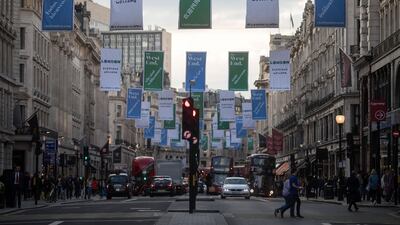British consumers are set for a rough year in 2018, as the knock-on effects of the Brexit vote continue to push prices up for everyday products from bread to televisions.
"At the moment where Brexit sits, it's probable that sterling will go down further, so import costs are going to continue going up," Jonathan De Mello, a retail analyst at Harper Dennis Hobbs, tells The National.
“That means prices for consumers will inevitably rise.”
Inflation surged following the EU referendum in June 2016 as the collapse in the pound ramped up the cost of goods imported into Britain.
The UK Consumer Price Index inflation rate – the key measure of inflation – was 3.1 per cent in November, the highest in almost six years.
At the same time, average weekly wages are growing at just 2.3 per cent, according to the latest data from the office for national statistics, resulting in a “squeeze” on household incomes.
Unfortunately for consumers, price hikes will be reflected in the high street, says Mr De Mello. “Businesses will have no choice but to pass on the higher costs to shoppers.”
Seeking to combat inflation rising far above its 2 per cent target, the Bank of England raised interest rates in November for the first time in 10 years.
The central bank hinted that the quarter-point increase, which reversed an emergency rate cut implemented after the shock Brexit vote, could be the first of several.
Alan Clarke, an economist at Scotia Bank, tells The National that the market is priced for "one-and-a-bit" rate hikes this year. "I'm in a minority looking for two hikes – in May, and again in November," he adds.
In a report this month, the credit card firm Visa warned that a full recovery in consumer spending is unlikely in 2018.
Visa’s consumer spending index fell by 1 per cent annually in December, rounding off the worst year for UK spending since 2012.
__________
Read more:
UK growth to remain weak in 2018 as Brexit uncertainty weighs
Fall in UK Christmas spending caps off worst year since 2012, finds Visa survey
__________
High street retailers such as Marks & Spencer, Debenhams and House of Fraser have all reported sluggish trading over the crucial Christmas season and warned of difficult conditions this year, as higher prices and Brexit uncertainty lead households to tighten their purse strings.
Policymakers have insisted that Brexit-fuelled inflation is “close to its peak” and will begin to ease back towards its target in the “medium term”.
A recovery in sterling could help to ease inflation, but that very much depends on how the Brexit talks pan out.
The pound has been whipsawed by headlines surrounding the status of the UK’s eventual exit from the EU. Having plunged from US$1.50 to a low of $1.33 after the Brexit vote, and further still to $1.19 in January last year, it has bounced back recently, helped by the EU green-lighting the start of trade talks.
Mr De Mello argues that this will be short lived. “As soon as the Brexit talks resume, sterling is likely to go lower again,” he says.
Ken Odeluga, a market analyst at the financial forecasting firm City Index, says that a hard Brexit, where the UK relinquishes full access to the EU single market and the customs union, remains one of the biggest risks to the outlook for sterling in 2018.
“There’s a lot that could go wrong with the economy and with the process of Brexit,” he says. “There is definitely scope for that to deteriorate further and weigh on the currency.”
Recent consumer confidence data suggests the British public is in no mood to spend.
The market research institute GfK's measure of consumer morale hit a four-year-low in December, as Brexit-battered households took a gloomier view of their personal finances.
"I think consumer confidence will stay pretty fragile this year," Howard Archer, chief economic advisor to the EY ITEM Club, tells The National.
There is, however, a silver lining for retailers, as it appears that pessimistic “Remainers” are skewing surveys on willingness to spend.
A Bank of England study this month found that people who voted Remain were much more likely to give a pessimistic view of their personal finances after the Brexit vote than before.
Recent weak data could, therefore, reflect people’s dislike of the Brexit process, rather than a genuine drop in consumer confidence.
Given Leave voters – who are, after all, the majority of those who cast a ballot in the referendum – appear to have a fairly optimistic attitude to spending, retailers might find reason for cheer after all in 2018.

